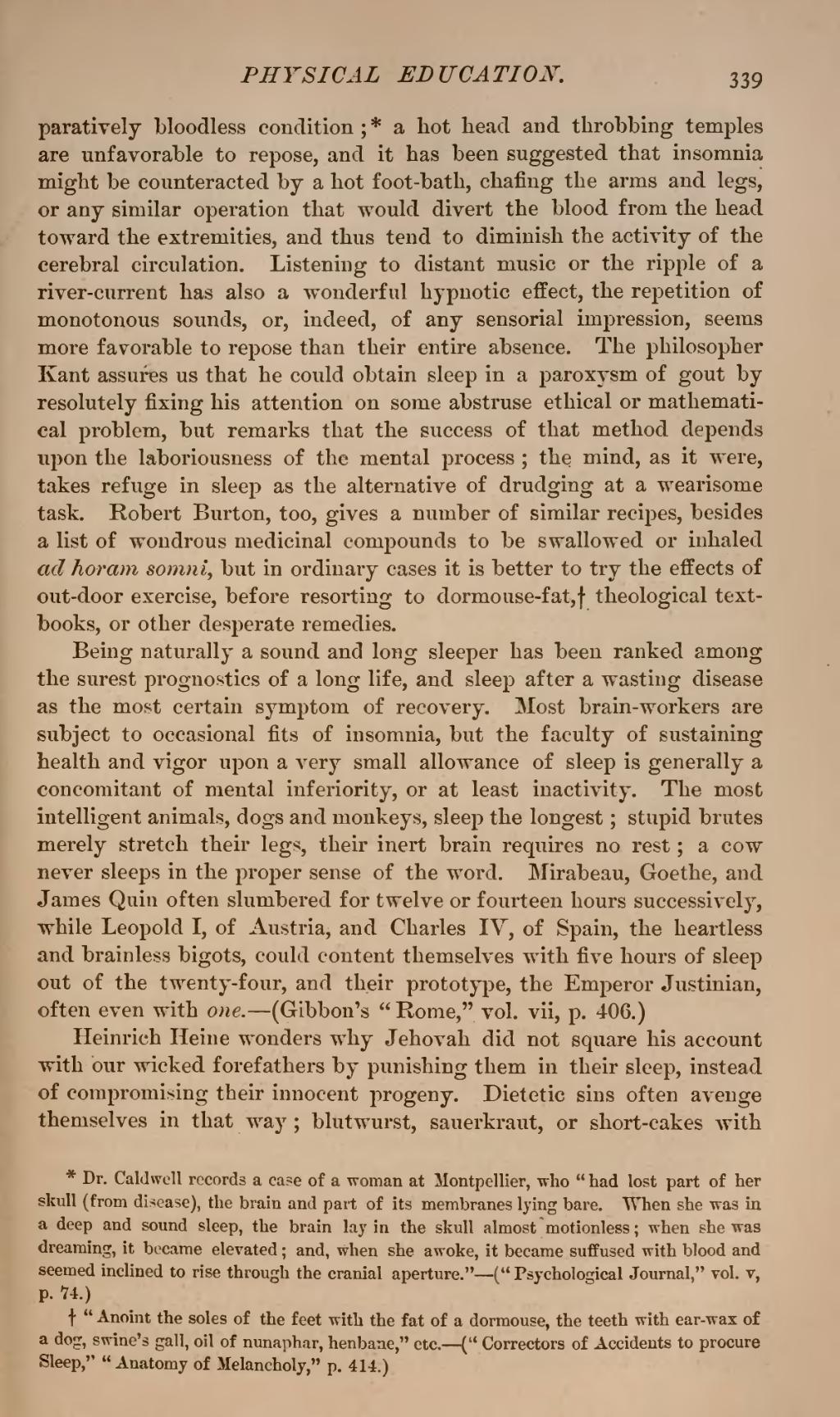paratively bloodless condition;[1] a hot head and throbbing temples are unfavorable to repose, and it has been suggested that insomnia might be counteracted by a hot foot-bath, chafing the arms and legs, or any similar operation that would divert the blood from the head toward the extremities, and thus tend to diminish the activity of the cerebral circulation. Listening to distant music or the ripple of a river-current has also a wonderful hypnotic effect, the repetition of monotonous sounds, or, indeed, of any sensorial impression, seems more favorable to repose than their entire absence. The philosopher Kant assures us that he could obtain sleep in a paroxysm of gout by resolutely fixing his attention on some abstruse ethical or mathematical problem, but remarks that the success of that method depends upon the laboriousness of the mental process; the mind, as it were, takes refuge in sleep as the alternative of drudging at a wearisome task. Robert Burton, too, gives a number of similar recipes, besides a list of wondrous medicinal compounds to be swallowed or inhaled ad horam somni, but in ordinary cases it is better to try the effects of out-door exercise, before resorting to dormouse-fat,[2] theological textbooks, or other desperate remedies.
Being naturally a sound and long sleeper has been ranked among the surest prognostics of a long life, and sleep after a wasting disease as the most certain symptom of recovery. Most brain-workers are subject to occasional fits of insomnia, but the faculty of sustaining health and vigor upon a very small allowance of sleep is generally a concomitant of mental inferiority, or at least inactivity. The most intelligent animals, dogs and monkeys, sleep the longest; stupid brutes merely stretch their legs, their inert brain requires no rest; a cow never sleeps in the proper sense of the word. Mirabeau, Goethe, and James Quin often slumbered for twelve or fourteen hours successively, while Leopold I, of Austria, and Charles IV, of Spain, the heartless and brainless bigots, could content themselves with five hours of sleep out of the twenty-four, and their prototype, the Emperor Justinian, often even with one.—(Gibbon's "Rome," vol. vii, p. 406.)
Heinrich Heine wonders why Jehovah did not square his account with our wicked forefathers by punishing them in their sleep, instead of compromising their innocent progeny. Dietetic sins often avenge themselves in that way; blutwurst, sauerkraut, or short-cakes with
- ↑ Dr. Caldwell records a case of a woman at Montpelier, who "had lost part of her skull (from disease), the brain and part of its membranes lying bare. When she was in a deep and sound sleep, the brain lay in the skull almost motionless; when she was dreaming, it became elevated; and, when she awoke, it became suffused with blood and seemed inclined to rise through the cranial aperture." ("Psychological Journal," vol. r, P-74.)
- ↑ "Anoint the soles of the feet with the fat of a dormouse, the teeth with ear-wax of a dog, swine's gall, oil of nunaphar, henbane," etc.—("Correctors of Accidents to procure Sleep," "Anatomy of Melancholy," p. 414.)

